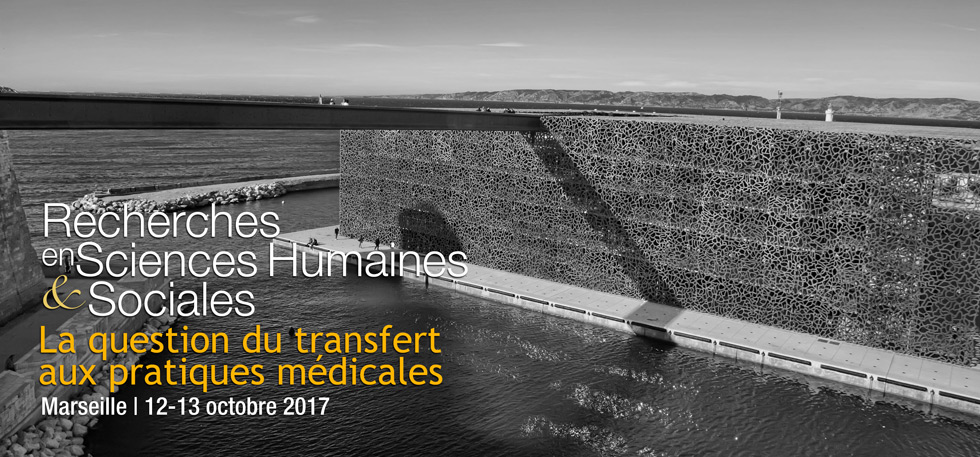
ProgrammeJeudi 12 octobre 2017
8h30 – ACCUEIL DES PARTICIPANTS 9h00 - 9h20 – INTRODUCTION Valérie Depraetère-Ferrier (SIRIC), Roch Giorgi (AMU-SESSTIM), Julien Mancini (AMU-SESSTIM), Pascale Bourret (AMU-SESSTIM) SESSION 1 – RECHERCHES EN COMMUNICATION DE LA SANTÉ : TRANSFERT VERS LA CLINIQUE Discutants : Roch Giorgi (AMU-SESSTIM), Marie Bannier (Institut Paoli-Calmettes) 9h20 - 11h50 – Intervenants invités
Achieving Shared Decision Making for all: how well are we doing and how can social science research help us do better?
The huge potential of shared decision making, if done exceptionally well
How shared decision-making is evolving in France and where we can be? 10h50 - 11h20 – PAUSE CAFE 11h20 - 12h20 – Communications sélectionnées
Next-generation sequencing in clinical practice: from the patients' preferences to the informed consent process
Evaluation of a context-adapted decision aid supporting critically ill patients' decisions about life-sustaining therapies: a pilot project
Comparative effectiveness of encounter decision aids for early stage breast cancer surgery across socioeconomic strata: study protocol 12h20-13h30 – BUFFET SESSION 2 – COLLECTE D’INDICATEURS PSYCHOSOCIAUX ET RECHERCHES INTERVENTIONNELLES : IMPACT SUR LES PRATIQUES MÉDICALES ET LES POLITIQUES PUBLIQUES Discutants :Anne Gaëlle Le Coroller-Soriano (INSERM, SESSTIM), Olivier Chinot (AMU, AP-HM) 13h30-15h00 – Intervenants invités
Acting on cancer and its determinants through evidence-based data: from basic research to interventional research in human and social sciences
How to identify psychosocial problems encountered by patients undergoing genetic testing? The development and use of a PROM in genetic counselling for cancer (communication annulée) communication annulée)Julien Mancini (Aix-Marseille Université, SESSTIM, France) How to improve patient’s information? Methodological challenges to reconcile research and action 15h00 - 15h30 – PAUSE CAFE 15h30 - 16h10 – Communications sélectionnées
French media and ideas about prostate cancer: Insights for public education (communication annulée)
Challenges in the development, implementation, and diffusion of a delirium screening tool in health services: The story of the NU-DESC 16h15 - 17h00 TABLE RONDE – ASSOCIATIONS DE PATIENTS ET RECHERCHE EN SHS : QUELLES RELATIONS ? Présidée par Dominique David (Association ARTC), Participants : Eve Bureau (Anthropologue, SESSTIM), Jean-François Moulin (Oncologue, IPC), Représentant comité de patients de l'IPC La table ronde se déroulera en français
------------------------------------------------------------------------------------------------------------------------------------------------------------------------
Vendredi 13 octobre 2017
SESSION 3 – RECHERCHES EN SOCIOLOGIE DE LA SANTÉ : MISES EN ŒUVRES ET CONSÉQUENCES DES INNOVATIONS MÉDICALES Discutants : Alberto Cambrosio (Mc Gill Université), Anthony Gonçalves (AMU, IPC) 9h30-11h00 – Intervenants invités
Situated Intervention: Experiments with Standardization for Patient-Centered Care
Investing in the future: Making genomic medicine work in cancer care
Organizing for innovation: exploring translational research in the making 11h00 - 11h30 – PAUSE CAFE 11h30-12h30 – Communications sélectionnées
Social Recognition of a Medical Innovation: the Case of Interventional Radiology in Oncology
CancerImmunotherapy and Family Medicine: Organizational and Professional Transformations in the Translation of Oncology Innovation within Primary Healthcare in Cuba
Coordinating the expertise of social scientists, health professionals and patients in interventional cancer research: The issue of relationship fluidity and the extension of socio-technical networks 12h20-13h30 – BUFFET SESSION 4 – RECHERCHES EN ANTHROPOLOGIE DE LA SANTÉ : APPORTS POUR LA PRATIQUES MÉDICALE DE L’IDENTIFICATION DES LOGIQUES SOUS JACENTES AUX COMPORTEMENTS DES PATIENTS ET DES PROFESSIONNELS DE SANTÉ Discutants : Sylvie Fainzang (INSERM, Cermè3), Thérèse Aurran-Schleinitz (IPC) 13h30-15h00 – Intervenants invités
Elderly patients treated with chemotherapy: how the person’s “rocky path” can be of use to medical end of life practice
An anthropological approach of Tamoxifen: what conclusions for medical practice? 14h30-15h20 – Communications sélectionnées
The light beyond biology. Sociological perspectives on breast cancer (communication annulée)
Breast cancer in time. What a medical anthropological analysis can show about the uses of chronicity in early stage and metastatic breast cancer 15h20-15h30 – PAUSE CAFE 15h30-16h00 – CONCLUSION
|

